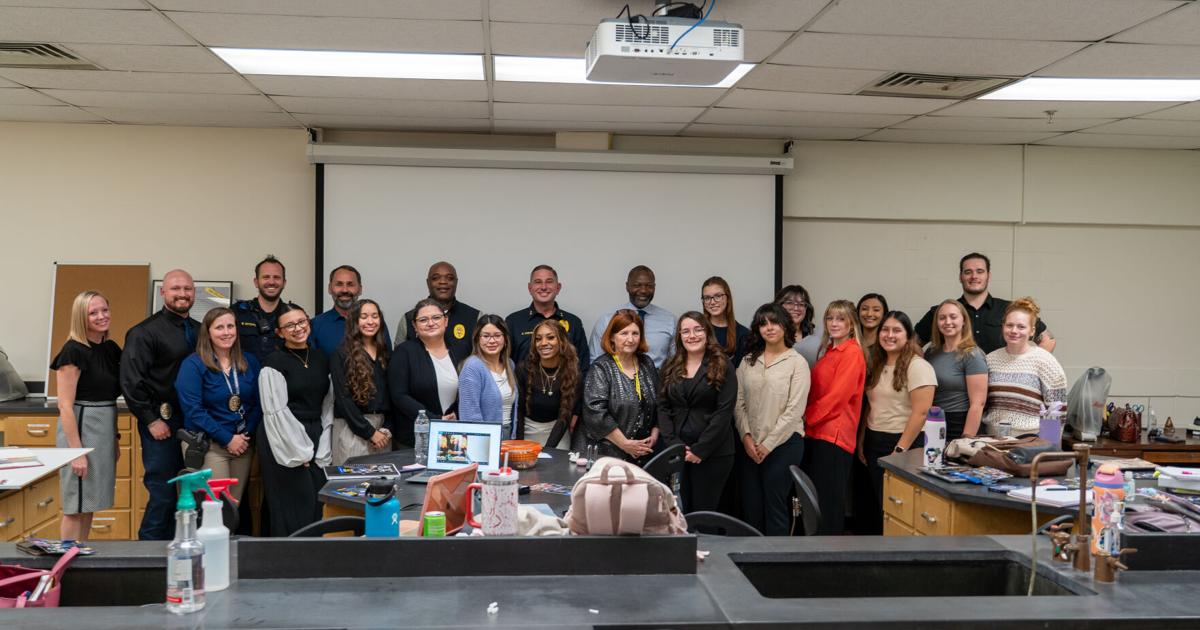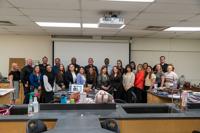Photo courtesy of the Arlington Police Department
The students assigned to the Gonzalez case worked diligently, arriving hours before class began and leaving late.
They sifted through massive files containing medical examiner and crime lab reports for months as part of a cold case investigation class taught by Patricia Eddings, distinguished senior lecturer and director of the forensic applications of science and technology minor.
On Nov. 4, students involved were notified by police that an arrest was to be made.
“It makes me really happy that all the hours that we’ve put into everything has resulted in an arrest and that we helped the victim’s family and friends and everything get some answers that they’ve been waiting so long for,” said Jenna Lewis, a criminal justice and biology senior on the case.
Since 1991, detectives investigating the death of Cynthia Gonzalez, a 25-year-old adult entertainer, have pursued numerous leads but never made an arrest. In 2024, the case was assigned to a current homicide detective for review, according to an Arlington Police Department news release.
Following an initial review of the case, the detective did not find any new evidence or leads but agreed to keep the case open.
Beginning this semester, students in Eddings’ class were given the opportunity to review real Arlington Police Department cold cases and were provided access to all reports and materials from the case files except physical evidence. The Gonzalez case was one of three given to the students.
Photo courtesy of the Arlington Police Department
Throughout the semester, the four students, Jacey Concannon, Jenna Lewis, Preston Schroeder and Natalia Montoya, communicated directly with the homicide detective. During their investigation, the students latched onto Janie Perkins.
The group said Perkins, the suspect, stood out because of failed polygraph tests.
Perkins was a friend of Gonzalez, and both shared a romantic partner, according to the news release. Weeks before the murder, the partner told Perkins he was calling things off to be with Gonzalez. Perkins could not provide the original detectives with an alibi, but she was never charged.
After current detectives reviewed the case again, they learned witnesses came forward, claiming Perkins had admitted to being involved in the crime. Detectives compared the statements from the witnesses to the evidence in the case and found they aligned.
After consulting with the Tarrant County District Attorney’s Office, detectives moved forward with filing criminal charges against Perkins, who is currently out on bail.
Roxana Carpenter, a biology senior in the class, said she was ecstatic for the students who worked on the case.
Carpenter said the arrest was unexpected. The students thought they would only be discussing the cases with detectives.
“It was very exciting to watch the group after putting in so many hours on the case,” Carpenter said.
Eddings said being part of this class might give the students a leg up in their professional careers.
“It has given them the impetus to work with the police and to understand what they do,” she said.
Lewis said she wants to work with DNA analysis in a crime lab.
“Being behind the scenes and helping out the victims and the victim’s family and being able to do it in that way just sounds like something I know I want to do,” she said.
The lessons and experiences the students in the class receive are not lost on them.
“Having a class where you can kind of put in all that knowledge into a real-world situation, I think it’s really helpful,” Lewis said. “It helps us get a glimpse into, ‘Is this for sure something you want to do?’ or reinforce, ‘I want to do this.’”
@tay._.sansom


